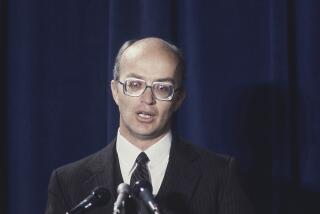Watt Charged With Perjury in HUD Case
- Share via
WASHINGTON — Former Interior Secretary James G. Watt was indicted Wednesday on federal charges of perjury, obstruction of justice and hiding subpoenaed documents dealing with his alleged role in the Housing and Urban Development scandal of the Ronald Reagan Administration.
The 25-count indictment accuses Watt of lying to a federal grand jury and Congress about lobbying former Housing Secretary Samuel R. Pierce Jr. and other officials of the department on behalf of private developers after resigning his post in 1983.
In announcing the indictment by a federal grand jury here, independent counsel Arlin M. Adams said that the investigation of Watt already is enabling the federal government to recover nearly $10 million in low-income housing funds for a Virgin Islands project that the indictment alleged was funded at Watt’s request but never used to create low-income housing.
“The indictment makes plain that the public trust was betrayed twice,” said Adams, a former federal judge: “First, by the award of scarce HUD housing funds during the 1980s according to the dictates of favored insiders, rather than the needs of the poor; and second, by a cover-up of those facts that has now extended for over four years.”
Watt, who had declined to discuss the investigation in recent weeks, denied in a written statement distributed by his attorney, William Bradford Reynolds, that he had lied to the grand jury or Congress or obstructed justice.
Contending that Adams and his lawyers “have exercised unchecked and unlimited powers during their five-year investigation,” Watt said that the prosecutors repeatedly “asked me to lie by pleading guilty to things I never did. As much as I wanted to avoid this humiliating and costly experience, I would not lie.”
“With truth as my weapon, I will stand and fight,” Watt vowed. “I am trusting God that justice can arise and will prevail.”
Watt, who now lives in Jackson, Wyo., theoretically could be sentenced to a maximum of 125 years in prison if convicted on all 25 counts and fined $250,000 for each offense. But under the U.S sentencing guidelines, maximum punishment would be well below that.
He resigned after controversy over his statement characterizing members of an advisory panel as “a black . . . a woman, two Jews and a cripple.”
The grand jury noted that after leaving the Interior Department, “and despite his lack of any prior HUD experience,” Watt “was paid more than $500,000, and was promised additional sums, for successfully approaching HUD Secretary Pierce and other high-ranking HUD officials during 1984 to 1986 to obtain HUD funding and benefits for private landlords and developers.”
The 59-page indictment cited Watt’s testimony before a House subcommittee and before the grand jury as the basis for the perjury, false statement and concealment charges.
One perjury count, for example, cited Watt’s testimony that he received $20,000 for assisting with the funding on a New Jersey housing project and $100,000 on a Puerto Rico project. “That’s what they offered, and it sounded like a lot of money to me, and we settled on it,” Watt told the subcommittee.
But Watt knew those statements were false, the indictment charged, because Joseph Strauss, a former special assistant to Pierce at HUD who headed a firm that sought funding for developers and landlords, had promised to pay Watt $200,000 if the Puerto Rico project was funded. Moreover, Watt, shortly before testifying, had submitted a $200,000 bill of which $100,000 remained to be paid, the grand jury said.
Last April, Strauss pleaded guilty to conspiracy and to covering up that a developer paid him $50,000 to help arrange financing for a low-income housing project and pledged to cooperate with Adams’ investigation.
On the allegations that Watt perjured himself before the grand jury, the indictment cited his testimony that he had no records of his phone conversations with Strauss about his congressional appearance. “I never keep notes of those things,” Watt told the grand jurors.
Watt volunteered that he worked on a computer but routinely reused the disks and thus kept no record. Asked if he had a memorandum of a conversation with Pierce on a housing project, Watt responded: “I intentionally don’t make such memoranda so that lawyers like you won’t be able to get them.”
Actually, the indictment charged, Watt had failed to hand over to the grand jury telephone logs and other records of his conversations with Strauss and computer disks that he had which included “materially different versions” of his statement to Congress.
Robert Warren, an attorney on Adams’ staff, declined to explain how the government had obtained the disks and records, saying that he could not go beyond the indictment but that such proof would be presented at trial.
More to Read
Sign up for Essential California
The most important California stories and recommendations in your inbox every morning.
You may occasionally receive promotional content from the Los Angeles Times.









